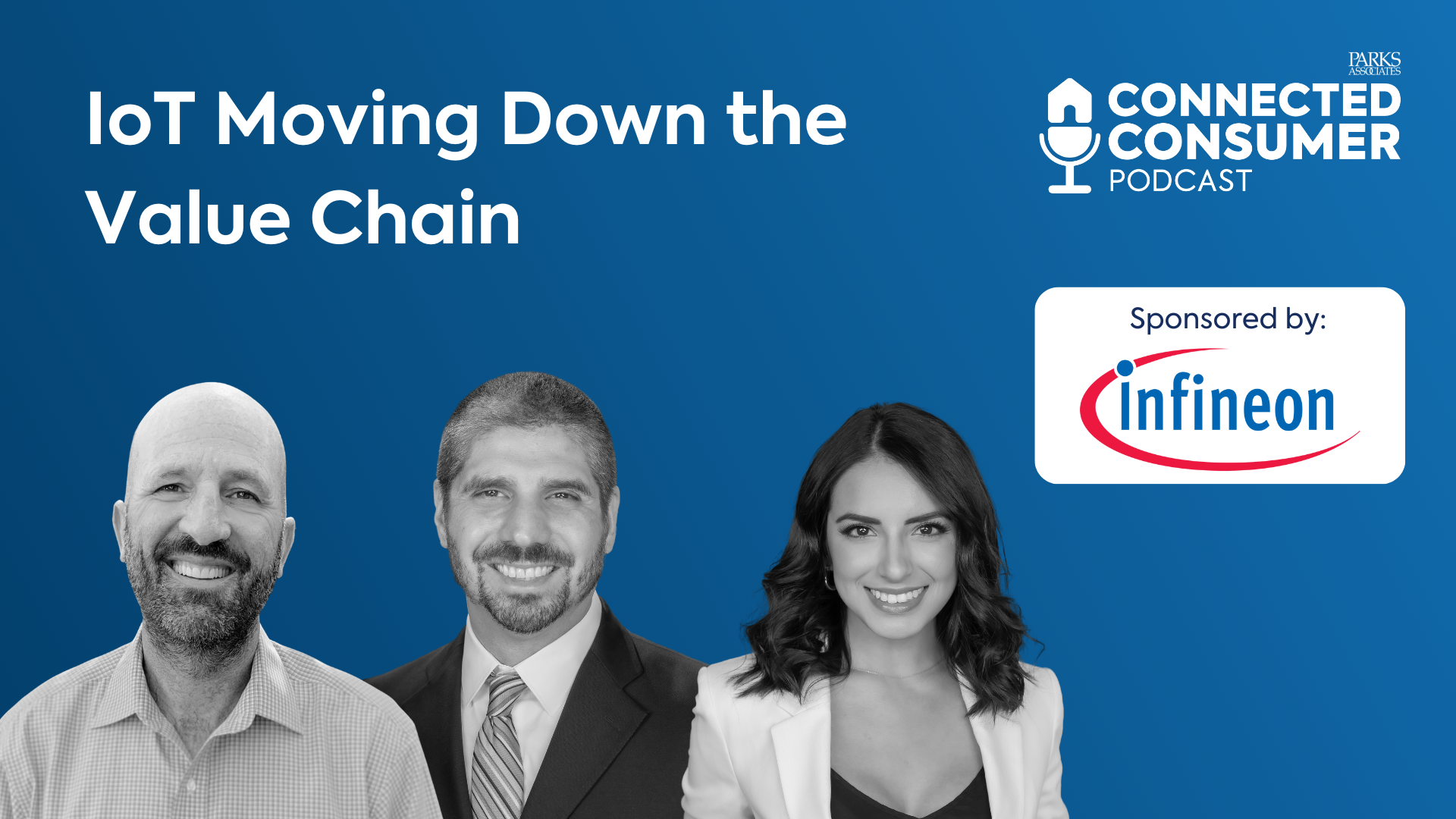 Parks Associates’ podcast, The Connected Consumer just released a new episode where hosts Chris White and Rosey Ulpino Sera dive into hot IoT topics, with guest speaker Rob Conant, VP of Software and Ecosystem for Infineon Technologies.
Parks Associates’ podcast, The Connected Consumer just released a new episode where hosts Chris White and Rosey Ulpino Sera dive into hot IoT topics, with guest speaker Rob Conant, VP of Software and Ecosystem for Infineon Technologies.
Throughout this episode, they discuss how IoT components increasingly gather data that makes them more intelligent and improves their performance. They also address the latest semiconductor and microchip innovations that are helping simple battery-powered IoT devices work better while preserving battery life.
For today's episode, we are joined by Infineon Technologies, Vice President of Software and Ecosystem, Rob Conant, to chat about how IoT components are increasingly gathering data that makes them smarter and helps improve their performance.
I'm excited to have this conversation. There is a lot going on over at Infineon, and we're excited to dive into the convo. Tell us a little bit more about, your background, your role at Infineon, and a little bit about Infineon too.
Infineon is a semiconductor manufacturer. We, you know, supply semiconductors across all sorts of different industries. A lot of power components, motor components, industrial, automotive, smart home, computing products, and connectivity products. We are a really broad diversified supplier of semiconductor products. And we're also quite advanced in software in a number of different areas too. Now, I, myself am an IoT guy. I've been in the IoT space for much of my career, in software companies and hardware companies. I started one of the Seminole companies, a company called Dust Networks. That was back in the early days of IoT when these kinds of connectivity technologies weren't really ubiquitous.
And I've been in full stack companies in the smart grid space selling to electric utilities. I came to Infineon through the acquisition of a company. I started a software company that provides product analytics to companies making consumer electronics products. And I'm not sure I mentioned this last time, but I'm also on the board of an organization that's really cool called Rainforest Connection that uses IoT technologies to fight climate change by monitoring the rainforest for illegal logging and also monitors biodiversity, which is really cool. So, everything IoT is within my domain.
Yeah, that's awesome. So, you said a couple of things there that we need to get back to, but the first thing I was thinking about was when I first came to work at Parks Associates and I understood the smart home space really only as a consumer, and as an analyst of consumer experience data, I started to learn more about what was going on behind the scenes.
And the analogy we came up with together, I think, is good and really helpful to our listeners, which is that in traditional devices around the home, they were optimized essentially in the factory by the manufacturers, and they didn't communicate with each other at all. So, the evolution of the smart home is the idea that now the devices are communicating with each other in our little home ecosystem.
They can be optimized; they can work better. It's not just adding extra features that are nice to have. It's also about efficiency and like kind of a practical level. And that's what component makers like yourselves that are a little bit behind the scenes sometimes and not, the brands that I knew about before I came are doing a lot to change what's going on to help optimize by making communication more sophisticated internally. So, I thought that was a really cool thing that you came up with, and a good analogy for connecting the impact to consumers by making an analogy that we can understand.
Exactly. And you got that, you got that right on the money. That's exactly right. So having been in this IoT space for a long time, Chris, I think consumers, but especially the people who are involved with your events and, and podcasts, you know, people are thinking about the connected consumer, thinking about the connected industry, and largely thinking about how those products get better or deliver new capabilities to those customers. And so today it's kind of common knowledge or common view that if someone's making a smart home product, they're going to collect some data to understand how that product is working so that they can improve the next generation of it, right? Or maybe even improve that generation of it. You know, Apple with their phones, they're updating the software based on data from the field, and even the companies that are making the apps on the phone are updating those apps based on real measured crashes from apps on those phones. Tesla is monitoring their vehicles on the road and not only designing new products based on that data but also improving the existing product in the field through software updates to those products.
To continue the conversation, join the Connected Consumer community and listen to the podcast’s latest episode today: www.connectedconsumerpodcast.com
For more information about Infineon and its latest solutions, please visit https://www.infineon.com.
Parks Associates projects that the U.S. smart home device market will generate $15 billion in annual sales revenue by 2029. While DIY remains the entry point for many households, Parks Associates’...
A recent Parks Associates and Cox Communities study found that more multifamily residents with home internet can get access to gigabit download speeds. In a new white paper, A Guide to Connecti...
Parks Associates reports that 89 per cent of US internet households subscribe to at least one streaming service and 45 per cent watch free ad-based services. Additionally, the firm reports that...
According to Parks Associates research covered by SecurityInfoWatch, pro monitoring is also gaining traction as households seek hybrid solutions that balance automation with human verification, br...